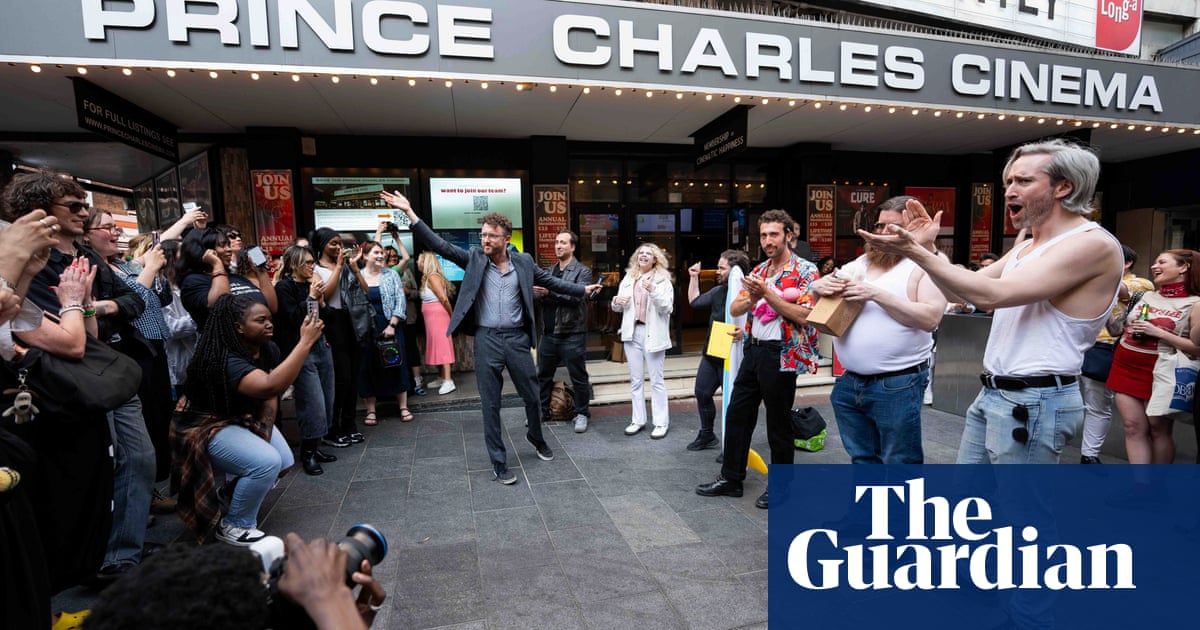On a sunny, bustling late afternoon outside a cinema in Soho, central London, more than a hundred people have gathered, a number of whom sort of, if you squint, look a little bit like the actorNicolas Cage.
There is a Raising Arizona Cage, moustachioed and with a Hawaiian shirt. There are several Con Air Cages in white vests, one of whom has a toy bunny in a small cardboard box. Several can genuinely claim an uncanny likeness to the actor; one or two others might uncharitably be said to be closer to Cage’s character in Face/Off, who surgically swaps his own distinctive features for the face of someone else – in that case, John Travolta – who looks nothing like him.
For a performer whose public persona is never less than eccentric, a parade of several Cages might feel entirely appropriate. The explanation for this event is more prosaic, however. The actor has a new film out: The Surfer (“gloriously demented” –the Guardian), and as movie PRs are learning, if you’re after a burst of offbeat publicity these days, there’s no surer way to do it than with a supposedly spontaneous, designedly shonky celebrity lookalike contest.
t“I’ve had a whole lifetime of ridicule and this is my moment of glory,” says Raising Arizona Cage Daniel Breuer, who works in the music industry and says he is compared to someone famous almost every day of his life. While Serpico-era Al Pacino and Jerry Seinfeld also feature, “Nicolas Cage has been the only constant”.
Actor and web designer Patrick Doran, too, says it is a constant refrain. “When I was younger, people used to say I looked like a young Nic Cage. Now it’s just: ‘You look like Nic Cage.’ I take it as a great compliment.”
We can blame it all on 23-year-old American YouTuber Anthony Po (subscribers: 1.9m), who last October posted 100 sheets of A4 advertisinga Timothée Chalamet lookalike conteston lamp-posts around New York – he later said he had done it for a bet. Several dozen Chalamets showed up, as well as 10,000 or so other spectators and – surprising even Po –the real Chalamet. It concluded with four arrests, a $50 (£37.60) prize for the winner, and a worldwide publicity storm.
Dublin was next on the bandwagon, hostinga Paul Mescal doppelganger contesta few weeks later, at which some other pale Irish men in short shorts competed for €20 (£17), three pints anda packet of Denny’s sausages. Though the actor didn’t make an appearance himself, he was later introduced to the winner, wannabe screenwriter Jack Wall O’Reilly,on a radio showand congratulated him on “captur[ing] the spirit of me very well”.
From there, inevitably, things snowballed. AHarry Styles lookalike contest in Londonoffered prizes of £50, wine and some hair products. A group of friends in San Francisco, noting that only white male celebrity clones had been sought so far, organised a hunt forDev Patel doppelgangers. (“I just took people out and handed out burritos,” said eventual winner Jaipreet Hundal of his $50 prize bonanza.)
Chicago threw aJeremy Allen White contest, at which the cutest contender wasa toddler Carmiein white T-shirt and apron. New York sought a lookalike Zayn Malik, although it was unclear ifthe eventual winnerwas familiar with any One Direction songs.
Glen Powellpersonally endorsedhis own lookalike contest in Austin, Texas, in November, inviting Powell clones to help him stage “a criminal Glenterprise” – “We all have the same face, it’s the perfect crime” – and attending (almost) in person, via a video call to his mum, who was one of the judges. He also offered arguably the first genuinely valuable prize: a cameo appearance for the winner’s parents in his next movie.
By the timeDrake was offering $10,000to the winner of his own lookalike contest in Toronto in December – claimed by a 21-year-old woman, Makayla Chambers, who had pigtails and a drawn on beard – one might have questioned if the trend had jumped the shark.
Not according to Cage’s publicists, who on Friday were offering prizes for the People’s Cage (“best overall lookalike”), the Cagiest Cage (“best cosplay”) and the Ragiest Cage (hopefully self-explanatory).
First prize: life membership of the historicPrince Charles cinema, was awarded by popular acclaim to Breuer, who said he felt “like I won the Oscar, which of course Cage did for Leaving Las Vegas”. Some of the other competitors had had him “quaking in his snakeskin boots”, he said, “but I knew I had the highest kick in the game”.
